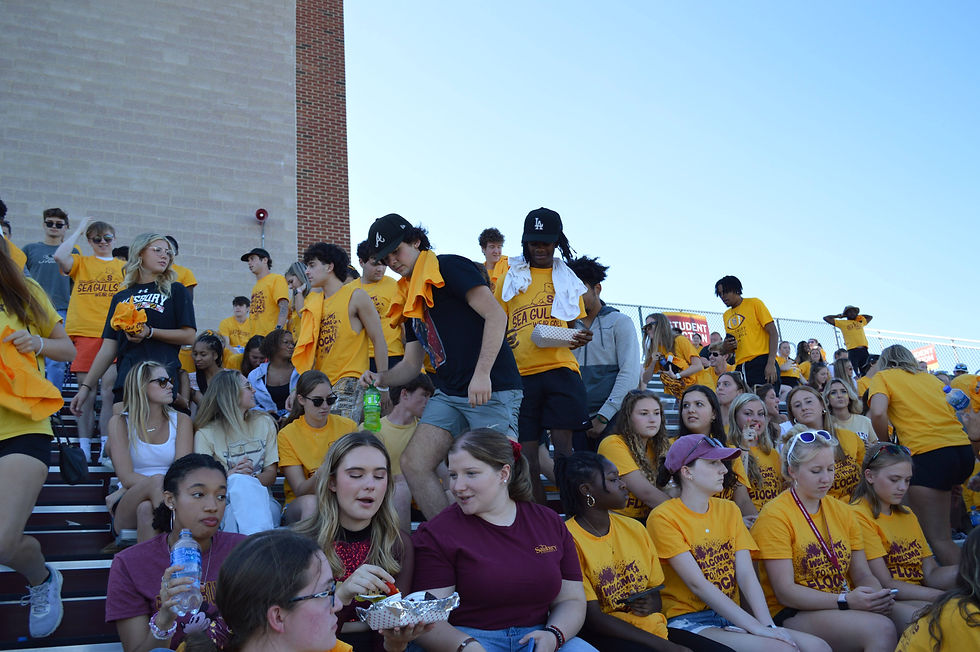SU student's research adapts video gaming to aid hearing-impaired audiences
- Staff Writer

- Dec 10, 2019
- 3 min read
A Salisbury University student who enjoys playing video games like “Apex” and “Overwatch” and building personal computers has taken an interest in universal audio accessibility for gaming.
SU senior and member of SU’s Honors College Cameron Kane is dual majoring in computer science and interdisciplinary studies.
Kane also holds the honor of a rare acceptance into Upsilon Pi Epsilon, the first and only existing international honor society in the computing and information disciplines. UPE has chapters at more than three hundred college campuses.
During the summer of 2017, Kane realized there was a problem in the gaming industry with accessibility. Specifically, Kane’s imagination was sparked with interest one day when he came across a video on Facebook.
The video was of a well-known YouTuber and actor Daniel Durant, best known for his part in ABC Family’s show “Switched at Birth.” Born without the ability to hear, Durant has never known sound, but has always loved video gaming and has shared those experiences in a series of videos on YouTube.
In an article by the New York Times, Durant explains his passions.
“I love gaming,” Durant said. “There are a lot of deaf gamers in the world, and online we all get together and challenge each other. We establish a computer connection where we can look at each other on screens, talking to each other in sign language.”
After noticing the issues in gaming about the lack of subtitles and other disadvantages to people who are hearing-impaired, Kane started asking his professors questions on ways to fully develop the many ideas he had on audio assists and audio accessibility.
People with hearing impairments miss a lot of audio that is communicated through expensive headsets that improve vocalizations of footsteps and other sounds in games. The audio gives gamers an advantage over other players who are hard of hearing.
Even at a young age, Kane said he was “able to put a designer hat on while playing video games.”
After Kane spoke with his professors about audio recognition and audio localization, he came up with the solution.

“By applying generalized accessibility features into games, developers would not have to build their games from the ground up,” Kane said. “This would allow the hearing-impaired to be communicated audio events through tactile and/or visual sense.”
Kane’s research gave way to his winning of the Guerrieri Fall Research Grant and the 2019 SU Entrepreneur Competition.
Kane’s ultimate inspiration behind the project was his love for video games, which he feels had a grand impact on making him who he is today.
“Video games developed me as a person,” Kane said. “I love the attention to detail and wanted everyone to be able to experience that.”
Kane expressed how he enjoyed seeing the outside perspective from the developers in the way they built the mechanics that teach the player to improve in skill in the game.
Valkyrie Software Solutions is a tech startup that Kane founded to commercialize the audio assist to make and mass produce his prototype to the public.
Aside from his time gaming and creating, Kane also spends time being a cybersecurity engineer. Kane explained that he takes pride in providing protection for the people from the “cyber brutes of society.”
Having his family express how important helping people is with their career choices swayed him toward a different route by helping people who use the internet.
Kane’s interest in computers and technology has spanned throughout his lifetime, long before his studies at SU.
In high school, Kane spent his time working as a web intern for Montgomery County Public Schools. The position consisted of helping the MCPS central office and providing interface between directors and the IT department.
Kane helped MCPS to design their site, explained to the staff what was possible and offered up advice on some previous ideas that were out of date and provided solutions on how to fix them.
Kane feels that his time interning for MCPS, along with his membership in the International Honor Society in the Computing and Information Disciplines and his work in developing a sound data generator for training artificial neural networks, has developed him into a liaison at communicating between technical and non-technical people.
“I am good at communicating to people who are not specialists what is going on,” Kane said. “Making the complicated knowledge of computer science understandable to everyone.”
By JACK FIECHTNER
Staff writer
Featured photos by Cameron Kane Images.





Comments